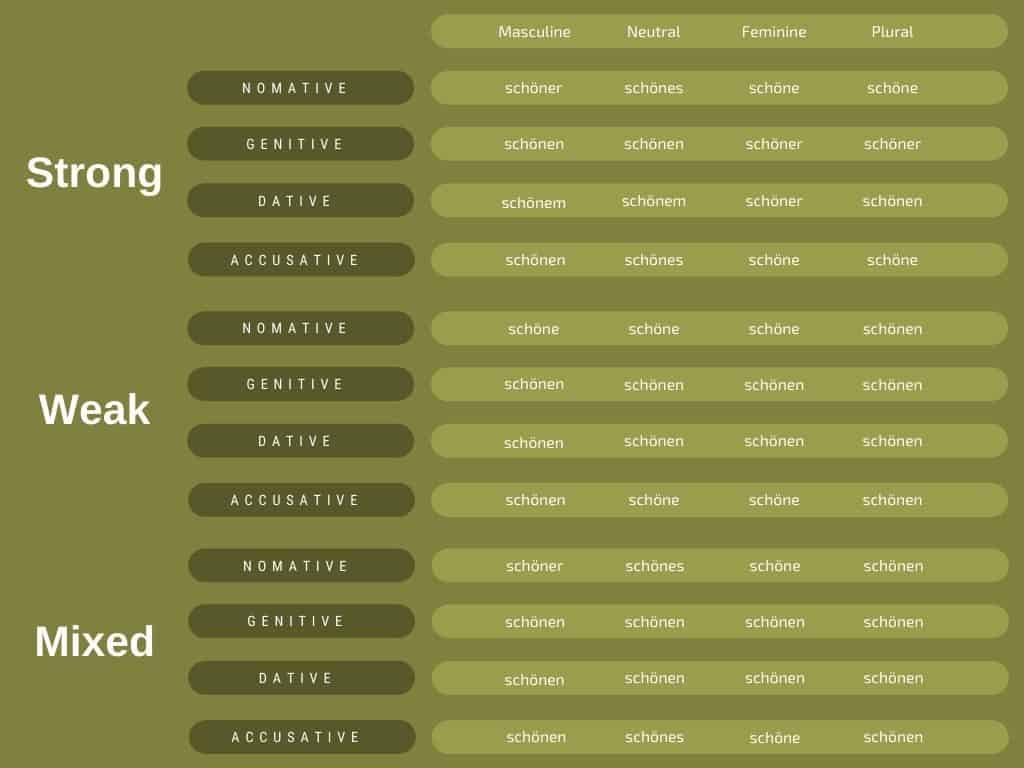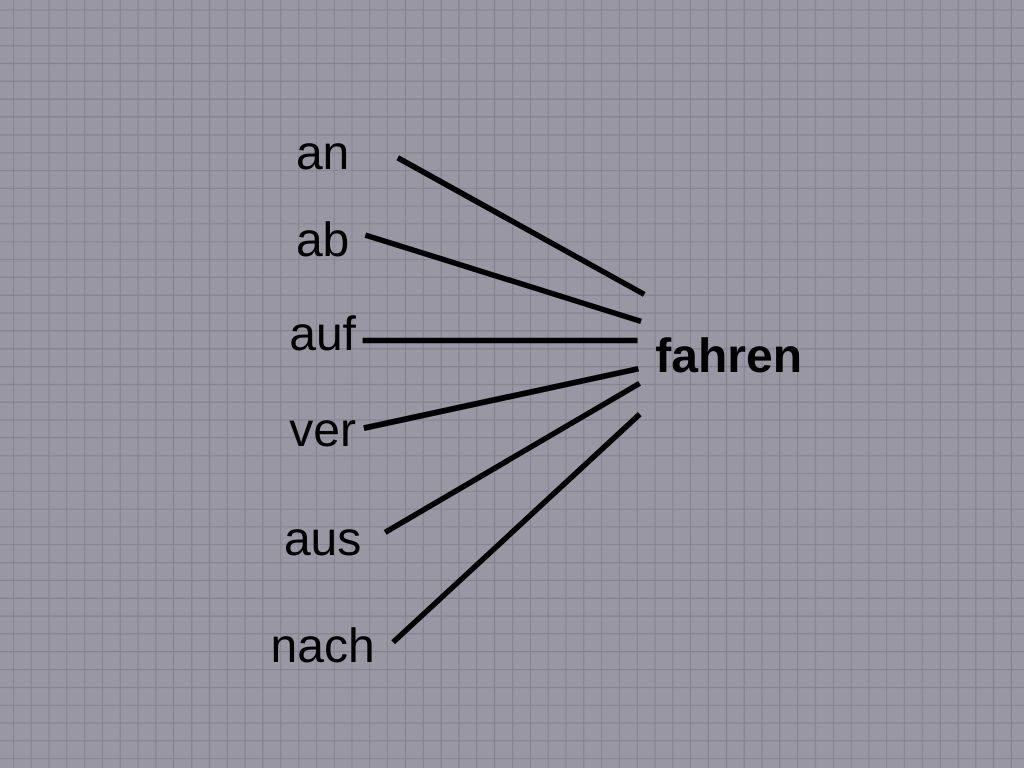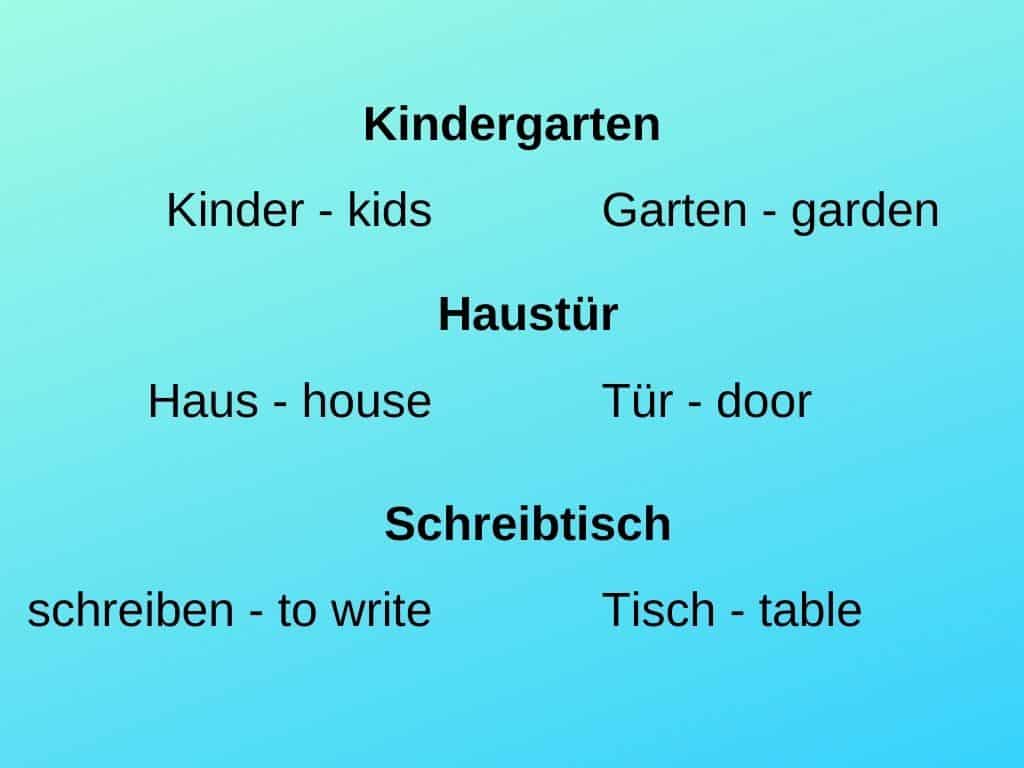
In the beginning, my girlfriend often asked me if learning German is hard, so here I want to summarize the reasons why I think that German isn’t harder to learn than any other language and why it is especially easier for English speaking people to learn the language.
German is related to English which often times makes it easier to learn, if you have the right motivation and mindset. The vocabulary isvery close to English and there are a lot of cognates that will make it much more easier for you to learn. Pronunciation is straight forward and follows simple rules which let you quickly pronounce any word after you learned it. The placement of verbs follows patterns which are rhythmic and easy to use. On top of that, there are also a lot of free resources for learning German available on the Internet which greatly will help you while trying to improve your German skills.
But why is it that people who just started out with learning German are often times so intimidated by the language? In my opinion it is like this with any new language you approach.
The mass of words and new grammar will just make you believe that you will never be able to learn it even though it isn’t all that hard.
In the following I will summarize the reasons why I think that German is a lot easier to learn for English speakers than it seems.
Please do not forget that every person is different and some aspects of the language feel easier to master for certain people than for others.
Nevertheless I still think that English speaking people have a great advantage over other people when it comes to learning German and how difficult you will experience your journey.
Let’s look at some of the things which make it easier and some of the things which make German harder to learn to see why I come to the above mentioned conclusion.
Even though you might think differently, I will show you why I don’t think that German is one of the hardest languages to learn
You Know 80% of The Vocabulary
Since German and English are related languages, the vocabulary is, of course, also related. This can make it easier to learn and memorize certain words and even help you to identify words that you have never heard before.
In fact, roughly 80 percent of the English vocabulary is incredibly close to the corresponding German words and it is a big reason why I don’t consider German to be one the toughest languages to learn for English speakers.
This closeness in terms of vocabulary makes sense if you consider that English with over 400 million speakers and German with roughly 100 million speakers are the most spoken west Germanic languages and developed from a common ancestor language.
Lets have a look at some German words which are close to their corresponding English words.
Let us – Lass uns
Water – Wasser
To identify – Identifizieren
Word – Wort
This is – das ist
Better – besser
Good – gut
To help – helfen
Open – offen
As you can see, we don’t have to do a lot of guessing to find out the meaning of those words, especially if we already know a little bit of German and see them in the context of some phrases.
Throughout your journey of learning German you will encounter these kind of words very often and you will often times find it easy to understand a sentence even if there are words you don’t know.
For some of these words there exist patterns which will help you when you encounter these words, but I personally think that it doesn’t help much to learn these rules by heart since the words are close enough for you to guess the meaning even without knowing some kind of fancy rule.
Some words with pf, and ff change to p in their English equivalents.
Pfeffer – pepper
Pfanne – pan
Pfennig – penny
German words that end on lich, ig, isch or ität can be translated by changing the ending to (l)y , al, or ic
Spezialität – specialty
persöhnlich – personally
freundlich – friendly
These rules however are not always applicable and I think even without knowing these rules, the patterns will become rather obvious after you learn German for a longer time.
On top of these close words you also will encounter words which are exactly the same as the words we use in English.
Most of the times (around 90%) just using the meaning of the English word will give you the correct translation, but there are also cases in which the German word has a totally different meaning, even though it sounds exactly the same as an English word.
Bekommen – sounds like to become, is translated as to get
Brief – sounds and is written like brief, is translated as letter
Chef – sounds and is written like chef, is translated as boss
These false friends, as they are called, will confuse you at first, but you don’t have to worry about them to much because you will over time be able to memorize the correct translation for them.
Learning to Pronounce New Words Is Easy

Pronunciation in English can often times be different from the written word while in German it is pretty straight forward.
Of course there are also a couple of words in German which don’t follow this rule but they are not as frequent as in the English language.
After you learned the German alphabet you will have no trouble at all to speak almost any word you read.
This doesn’t mean that every German word is easy to pronounce. That’s not true at all, and you will struggle initially until you are able to pronounce the diphthongs(ei, ch,…) or the Umlaute (ö,ä,ü) and then after you think it can not get any worse, you will encounter the German R.
Once you go past these it will be a piece of cake and speaking a word that you are reading will feel incredible natural to you.
As in every language there are certain clusters that people from a certain linguistic background find hard to pronounce.
It is no different in the German language but that isn’t something that makes German more difficult than any other language out there. (Try yourself at Chinese for example, or try learning to pronounce the Russian R and Schch sound)
Grammar

Gender and Cases
This will probably be the biggest section of this article and there is a certain reason for it. I have long lost track of how often I get told about how difficult and static the German grammar is and even though I want to tell you that it is easy I can’t really do so.
Most certainly German grammar isn’t easy, but in the end it all comes down to how you learn it and at which pace you move.
In my opinion learning grammar isn’t all about rules but more about just using basic sentences which are implementing the rule you are looking at.
Repeat this many times and your head will quickly grasp the patterns of how these sentences are built. So even though the German grammar isn’t easy, it has very logical patterns and not a lot of exceptions which makes it easier to learn these patterns.
One of the biggest issues that people seem to have with the German grammar is nouns and articles. It makes sense since German genders which determine the article don’t always make sense.
For example, the girl (das Mädchen in German) is a neutral word, while girls obviously are female.
On top of that there are six different articles in German and because that is simply not enough, they all change depending on the case. In the beginning German students often times get overwhelmed, because their teachers just give them a table full of all the articles and how they change.
Six articles times four cases equals twenty four words and rules you have to remember so I suggest that you go at it one case at another and divide by definite and indefinite articles.
Declension is one of the hardest things when it comes to learning German, but from my experience I know that it is something that just slowly builds in your brain over time.
You shouldn’t try to learn every form the noun can take by heart, instead focus on a single case and try to get that one right every time. After you feel confident you just move on to the next one.
Even though there exist rules on how to determine the gender, they are basically useless when trying to learn German.
It’s just plainly unrealistic to assume you would find the time, while you are talking, to think about the ending of a word and how this relates to its gender and after that think about how that influences the case then.
It is not recommended to learn these rules because there are a couple of problems with them. There are just far to many endings per rule. For example, words which end in
-ei
-schaft
-heit
-keit
-ung
-ion
-ik
-ie
-ur
are female most of the times.
Another problem with genders is, that some of the German words can have two genders and the meaning will change depending on which one you use. A good example for this is the word: See.
It has a female and a male article that can be used with it. Der See translates to: the lake, while die See translates to the ocean.
This can lead to a lot of confusion initially, and will only be resolved once you gain some better understanding of the German language. Even though these words with two genders are rare you will still encounter them from time to time.
You will just have to put in the time to learn these articles (genders), while you learn the nouns, by heart.
There are however, certain groups of nouns which always will have a specific gender and it might help to know these as you can quickly determine which group the noun belongs into and thus easily deduct the gender from it.
I’m joking, it isn’t that useful at all, sorry to disappoint you. Even though these categories exist, there are far to many of them so that it is way to impractical to use this while you speak.
Adjective Declension And Cases

The German language depends heavily on the noun when deciding the form of an adjective. The noun can belong into one of three categories (strong/weak/mixed) and there exists a total of four cases so there are already 12 different possible combinations.
However, it doesn’t end here. There are also four definite and four indefinite articles, which brings us to 48 possible combinations for the indefinite article and 48 combinations for the definite article.
To be fair, most of the times endings stay the same if you switch from definite to indefinite article, but you will still end up with 48 combination. (this doesn’t account for combinations which share an ending)
It will take you a lot of time until you can do these flawlessly, since it requires a lot of practice and repetition to be able to come up with the right combination without thinking about it.
Even though it seems overwhelming, you shouldn’t get discouraged by this. The German cases system is actually quite manageable if you focus on mastering one case at a time.
If you practice speaking, you should focus on getting one of the cases right at first (accusative is the easiest one so you should start with this one) once you are able to recognize and get this case right all the time, you should continue forward and start focusing on the next one.
Don’t try to learn all the combinations by heart as this will not help you using the case in an intuitive way.
Prefixes of Separable Words

This one is pretty straight forward, but can lead to a lot of frustration and confusion. You can think of these prefixes as conjunctions being joined to the verb, in order to modify the meaning. The new meaning can be logically connected to the conjunction but it isn’t all the times. Let’s look at an Example.
aufmachen, zumachen, vermachen, abmachen, anmachen, ausmachen, draufmachen, durchmachen
Aufmachen – to open something
Zumachen – to close something
vermachen – to leave something to someone (inheritance)
abmachen – to agree on something / to untack / to settle something
anmachen – to flirt
ausmachen – to switch of something / to constitute / to locate
draufmachen – to drink a lot
durchmachen – to pull an all nighter
The problem with these words is also, that they are heavily related to context as well. The prefix will not only alter the meaning, it will also add a couple of new possible translations to the word.
Some of them only get used in a certain type of phrase, some of them have a more general usage. For most of them, they can not just be learned by memorizing all the translations but only but listening to a German using them himself.
Verbs
The good thing here is that German has a lot less irregular verbs than the English language and the conjugation of verbs in German is fairly easy to master.
This is partly due to the fact that they follow the same rules for conjugation, but also because the German conjugation of verbs is pretty close to the English one.
Even though conjugation isn’t an issue for most of the people who learn the language, there certainly is something about verbs which causes frustration for many people. Separable and inseparable Verbs.
German verbs have the ability to split, and positioning those split up verbs can be a tricky thing to grasp. Let me give you an example for one of these separable words.
Ankommen – to arrive
Ich komme heute an – I am arriving today
Ich werde heute ankommen – I will arrive today
As you can see in the first sentence the verb is split into two parts and the word heute is put in the middle between the two parts.
Another problem which people tend to encounter while learning German is the positioning of “normal” verbs. In my opinion, this isn’t really a problem and can be easily grasped by doing the right kind of exercises.
There are clear rules for where to put the verbs in a German sentence so finding the right position comes down to finding out what kind of sentence you are dealing with.
If the sentence you are looking at is kind of a simple sentence, the verb will be usually put in the the second position, for example “Ich esse Pizza”.
If there is a subordinate clause, the verb will be usually put at the end of the sentence, except for certain special constructions (for examples sentences that start with deshalb).
Another exception are modal verbs, which will change the position of the modified verb and put it to the end of the sentence for simple sentences. In subordinate clauses, the modal verb always takes the last spot.
These things can be very well trained with active exercising, such as solving tasks specifically tailored for these topics but they can also be trained passively by reading books or doing listening comprehension.
Frequently seeing the verbs in the right position will make your brain get used to the pattern so I don’t feel like there is something particular hard about this.
Compound Words

German uses compound words, which is the reason why the German language has a lot of very long words. This also might seem intimidating at first, but you will quickly realize how useful this can be.
Often times you can guess the meaning of a compound word if you know the meaning of the words which are used to construct it. On top of that these compound words can also be a source of a lot of fun because often times the literal translation of them is hilarious.
Let’s have a look at some examples to show you what I’m talking about.
Kühlschrank – translates to fridge
kühl – cold
Schrank – cupboard
Handschuhe – gloves
Hand – hand
Schuhe – shoes
As you can see it is a lot of fun the learn these kind of words and they are pretty easy to remember if you split them up.
I personally think that it is quite interesting because you can see what the people thought about when they invented these words.
Another cool thing about compound words is, that they let you construct your own words easily if you feel like doing so. Of course you will need a deeper understanding before you are able to use this effectively but it can help you describe things if you are unsure about the exact translation.
I think being able to create your own words as you speak is a pretty cool thing which I have not encountered like this in any other language I studied so far.
If you want to read more about German compound words and why they are so long, check out my article about German compound words
Prepositions
There is one last aspect of the grammar I want to discuss here, which is prepositions. It is important to mention that some of the prepositions of the German language are tied to using a special case afterwards, which can be a source of a lot of mistakes. While some people recommend to just learn these by heart.
I personally think that it is easier to learn them by reading German texts or doing specific exercises. When you are aiming for fluency, it will not help you to just learn rules by heart since you have to become so familiar with the structure of the sentences that you can speak them without thinking.
You will not achieve this by learning the rule since it can only be achieve through a lot of repetition. So it is better to learn this by using it than to just learn these prepositions by heart.
You should also know that Germans tend to use these prepositions incorrectly in their everyday speech. (Not every German knows this and usually the right case will be used in written German)
On the other hand, this means that you can only learn the right way to speak while having a conversation or listening to a native German speaker. While talking, using the right case will make you sound like someone from the last century even though you are making no mistake at all.
Most of the times Germans will correct you on this but it can be weird to get told, that you used the wrong form even though you know it is the correct one.
How Are You Going to Study?
There are a lot of great resources for learning German on the Internet, which you can access for free if you chose to not spend any money on your German skills. German is widely spoken and the most used language of central Europe.
Youtube is a great resource when it comes to learning German, but there are also various written courses which you can take for free. Of course the quality of those courses will not reach the quality of payed ones (at least usually) but you will be able to get enough out of it to help you learn German on your own.
Apart from courses there are also websites which offer you exercises that you can take to test your recently acquired German skills and I definitely recommend you to use these.
Apart from traditional exercises and courses you can also use the Internet to find listening comprehension exercises for various levels of German. Studies have shown that people who do listening comprehension exercises, while they are learning a new language, tend to make faster progress than those who do not do these exercises.
Take advantage of technology, take some German mp3 files with you when you leave the house and listen to them while you are waiting for the bus or driving to work.
If you have the possibility try reading German books in your free time. There are books available for all levels of German, and once you reach an advanced level, the real fun starts, since you are able to read regular German books.
Try to find a speaking partner so that you can practice German with a native speaker.
Your speed of learning the language will also depend on how well you use these resources. However, you should keep in mind that some techniques and resources might not work out for you. This is something that everyone has to find out for himself or herself.
The right method of learning can greatly influence the difficulty of learning German.
I personally would find it incredible difficult to learn a language the way it gets taught in school, so some of these traditional courses out there would make it more difficult for me instead of easier.
The method which you use is, of course, up to you, but you should keep in mind the difference that a great teacher can make.
Are You Studying by Yourself?

The way in which you organize your studying will also influence the difficulty in a great way. Do you study under a teacher? Are you visiting some courses?
Especially in the beginning it can be a big advantage to do so and even for advanced students there are many useful courses out there.
Are you studying alone? If yes, it may be harder for you to make some quick progress, but it is by no means impossible.
You will probably have to put in more time and use your resources wisely but it can be done at the same pace. It just takes more work alone and it is the more unusual way to approach a new language.
Do you have the chance to practice with a native speaker? This will also be able to give you a great boost as you will get direct exposure to the language in this way.
At the same time an experienced native speaker can adapt the words he or she uses to your level of German, so that you will be able to get the most out of this experience.
I have seen great results using this technique and I advise you to try it out yourself. You can find partners to speak to on the Internet and it will be a teaching exchange.
Do you have the chance to visit Germany for a couple of weeks or months? Maybe you can take a German language course in Germany. This is by far the best way to help you on your way to mastering the German language.
The longer you are able to stay in Germany the better. Of course this is no requirement to learn how to speak German but being in the country itself exposes your brain to much more German than any studying at home ever could.
Even if you are absolutely new to the language and take your beginners course in Germany you will most likely see great results very quickly.
Your Motivation

In the end it all comes down to your motivation. Anyone can learn a language. It all depends on how much time he or she is willing to sacrifice to reach his or her goal.
Are you willing to put in all these hours to learn this skill? Are you willing to spend money on improving your skills? There is a lot to consider, but with the right mindset you will be able to master the German language. Spending some money on a course might be the right choice if you just started learning the language to give you some boost.
If you want to embark on this adventure you have to be clear about what you need to sacrifice. If you are serious about this you should at least be willing to spend half an hour every second day on practicing your German skills.
Learning a language is easier if you do it regularly. It is hard to see some results if you are only willing to put in an hour every weekend.
Are you able to motivate yourself enough to stick to this even if you might not see any results over a longer period of time? It takes discipline to master any language. German is no exception.
Only constant practice and exposure will allow you to internalize the language enough, so that you are able to speak it without thinking. It can take a long time to reach this level and while you are on this journey there might be phases where you get frustrated because you hardly see any progress.
If you have the necessary mindset to learn a language however, it will be a very rewarding experience which will not only open new doors to you but also expand the way in which you look at your own language.
Conclusion
Learning German can seen intimidating at first, but after you take some time and look at it closer it you will discover that it is actually not that hard for English speakers .
Most certainly, it isn’t the toughest language to learn. Of course you will have to put in a lot of time, and there will be topics in grammar and in other parts of the language, which will test your patience but that shouldn’t stop you from reaching your goal.
The similarities between the two languages especially in terms of vocabulary will help English speakers tremendously.
The fearsome compound words are not that hard to understand after you gain some experience and it can be a fun experience to study them or to make up some of your own.
German grammar might be strict and have a lot of rules, but like any other language practice is the key to success here.
Some topics will require more practice while others are easier to understand for English speakers but in the end it all comes down to investing the time to feed your brain with the patterns of sentences.